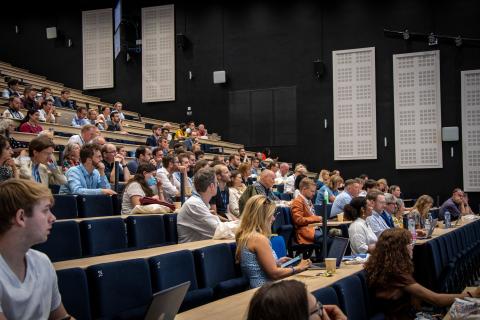PhD Conference Guide
First conferences can be a daunting experience for PhDs and Early Career Researchers (ECRs) and the Covid pandemic, global north visa policies, and caring responsibilities (to name a few) means that many PhDs have had scarce opportunity to attend conferences, especially in-person. This post is offered as a brief guide to encourage PhDs and ECRs to attend conferences and some hints and tips to get the most out of them, from covering costs to meeting people in your field.
 UACES Annual Conference 2022 in Lille. Photo: Melina Dieckgraber
UACES Annual Conference 2022 in Lille. Photo: Melina Dieckgraber
Your work is great!
Many PhDs don’t apply to attend conferences because they feel that their work is not ready to present. It is. What you have been working on for months and years will almost certainly be as good (usually better) than many papers submitted by more senior academics. There are a number of reasons for this, but PhDs are generally more up to date with the literature because they are immersed in it all the time. Not only will you get some helpful feedback on your work from established scholars, you’ll teach them a thing or two as well.
But conferences are expensive
So, now you’ve decided you’re ready to go to a conference you’ll need some funding. Most PhDs will have some form of research training and support grant but this (increasingly) doesn’t go very far. Fortunately, most societies and associations offer reduced fees for PhD and ECR members. What’s even better, most associations have a range of grants that can be used to attend conferences such as the UACES microgrant and travel support grant. Look at all the associations in your field and apply for all grants you’re eligible for. Most conferences will also put out a call for volunteers to help out (this usually involves working at the registration desk or signposting attendees around the venue). In return the conference will tend to cover your attendance fee and your association membership for the year. There are benefits to this, aside from the financial side it’s a good way to find out who’s attending and make friends with other volunteers. However, it can be a large time commitment during what will already be a very busy week so do think carefully about whether volunteering would be right for you.
Meet folk
The social dimension of conferences is almost as important as the academic side of things; doing a PhD can be notoriously lonely and finding people who share similar research interests provide vital support as well as helping you develop your work. While twitter is very much a double-edged sword, it is the online space where most academics tend to hang out and connecting with people in your field and arranging coffee/drinks/dinner/receptions with people before you go can make socialising in a new space much less daunting. But, if Twitter’s not your bag, most academics are more than happy to get a brief email explaining that you’re interested in their work and asking if they’ve time to meet (you can usually find a list of attendees in the conference programme). When you’re at the conference, just be nice to folk and chat with anybody you happen to meet, a lot of people will be in the same boat and happy to meet a fellow traveller.
Mix it up
Don’t just stick to your lane, go to panels in fields that you are unfamiliar with and see which work is being done in other areas of the discipline. It’s very easy to develop tunnel vision during your PhD and branching out will expose you to other ideas and ways of thinking which will make your work more interesting.
Don’t burn out
Conferences can be intense. Do not try to do everything or attend every panel. Make a calendar and go to the talks that are interesting to you but make space for some time alone and to go and see the city – it’s likely you’ll be visiting somewhere you’ve never been before and you should take the opportunity to go explore. Conferences should be fun and you deserve a treat.
For organisers
While this post is intended to provide conference advice for PhDs and ECRs, I want to end with two important points for conference organisers:
Hybrid:
One of the few good things to come out of the pandemic is that we have learned we can hold hybrid events and we can do them well. They encourage and support inclusion, allowing people to attend conferences who otherwise wouldn’t be able to due to, for example, childcare, disability, or global north visa policies. Just because we can go back to in-person conferences now doesn’t mean we should go back to in-person only. Hybrid must be the default and it must be meaningful: that means mixed panels rather than a separate one-day-conference, and a culture that actively encourages and fosters engagement between in-person and online participants.
Visas:
Flagship conferences are, by and large, hosted in the global north. This means that every year, without fail, several scholars from everywhere else in the world miss out because (though no fault of their own) they are not able to arrange visas in time. Conference organisers must provide additional support to ensure that everyone who has been invited to attend, can.

